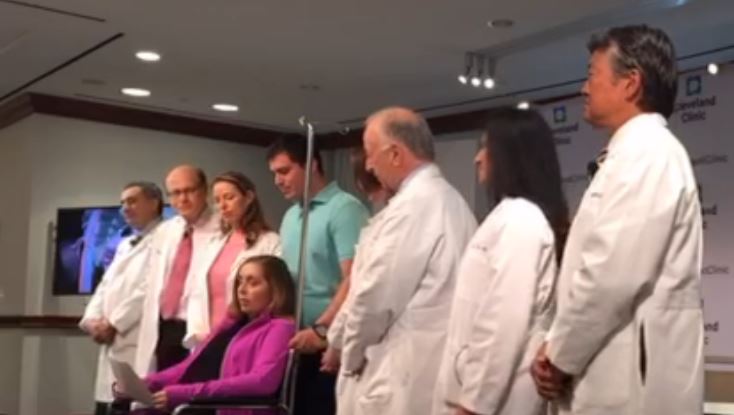In the clinic's press release today, she was gracious in commenting on the collapse of that dream.
“I just wanted to take a moment to express my gratitude towards all of my doctors," she said. "They acted very quickly to ensure my health and safety. Unfortunately I did lose the uterus to complications. However, I am doing okay and appreciate all of your prayers and good thoughts.”
The operation was the first in a clinical trial that will include nine more uterine transplants.
The first successful uterine transplants -- those that eventually produced babies -- were done in Sweden in 2014.
The Washington Post is reporting on the unique nature of the U.S. transplant:
The major difference between the U.S. and Swedish approaches is the use here of a deceased donor. In Lindsey's case, the donor was a woman in her 30s who had previously given birth and consented in advance to donate her organs, the doctors said. Ruth M. Farrell, an obstetrician and gynecologist who was part of the Cleveland Clinic team, said at Monday's news conference that there have been "some complications" for live uterus donors.
Lindsey, like other uterus recipients, was born without a womb. From The New York Times:
Uterus transplant surgery, still experimental, is meant to help women who want to become pregnant but cannot because they were born without a uterus, suffered damage to it or had to have it removed. Between 3 percent and 5 percent of women of childbearing age worldwide are estimated to be infertile for these reasons, and about 50,000 women in the United States are thought to be potential transplant candidates.
Here's today's full press release from the Cleveland Clinic:
We are saddened to share that our patient, Lindsey, recently experienced a sudden complication that led to the removal of her transplanted uterus.
On February 25, Cleveland Clinic announced the first uterus transplant as part of a clinical study for women who suffer from uterine factor infertility. At this time, the circumstance of the complication is under review and more information will be shared as it becomes available.
There is a known risk in solid organ transplantation that the transplanted organ may have to be removed should a complication arise. The medical team took all necessary precautions and measures to ensure the safety of our patient.
While this has been difficult for both the patient and the medical team, Lindsey is doing well and recovering.
The study, which has been planned to include 10 women, is still ongoing with a commitment to the advancement of medical research to provide an additional option for women and their families.”
Statement from Lindsey and Blake:
“I just wanted to take a moment to express my gratitude towards all of my doctors. They acted very quickly to ensure my health and safety. Unfortunately I did lose the uterus to complications. However, I am doing okay and appreciate all of your prayers and good thoughts.”- Lindsey
Original post
You can watch the post-operation press conference from the Cleveland Clinic until Tuesday morning, on Periscope. The recipient of the transplant, described only as 26-year-old Lindsey, starts speaking around 18:50 of the video.
Sitting in a wheelchair and reading from notes, with her husband standing behind her, she said she was immensely grateful to the family of the deceased donor. "They have provided me with a gift that I will never be able to repay," she said.
She said she was told at age 16 that she would never have children. "From that moment on, I have prayed that God would allow me the opportunity to experience pregnancy, and here we are today at the beginning of that journey. "
She also revealed she and her husband are parents to three adopted boys.
Here's the Associated Press write-up:
The recipient of the nation's first uterus transplant says she prayed for years to be able to bear a child, and is grateful to the deceased donor and surgeons who've given her a chance.
Surgeons at the Cleveland Clinic said Monday that the 26-year-old woman is recovering well after receiving the uterus late last month. The experimental surgery is part of a new frontier in transplantation that, if it works, might be an alternative for some of the thousands of women unable to have children because they were born without a uterus or lost it to disease.
The woman, identified only as Lindsey, told reporters she already is a mother to three "beautiful little boys" adopted through foster care.
But since being told at age 16 that she would never have children, she said "from that moment on I have prayed that God would allow me the opportunity to experience pregnancy."
She will have to wait a year, undergoing regular doctor checks, to ensure the new uterus is healthy enough to try, using in vitro fertilization.
"We must remember a uterine transplant is not just about a surgery and about moving a uterus from here to there. It's about having a healthy baby," said Cleveland Clinic surgeon Dr. Rebecca Flyckt.
The hospital has screened more than 250 women to identify 10 who qualify for the clinical trial, those who lack a uterus but have healthy ovaries that produce eggs. Using those eggs, doctors freeze six to 10 embryos before the woman undergoes the transplant.

